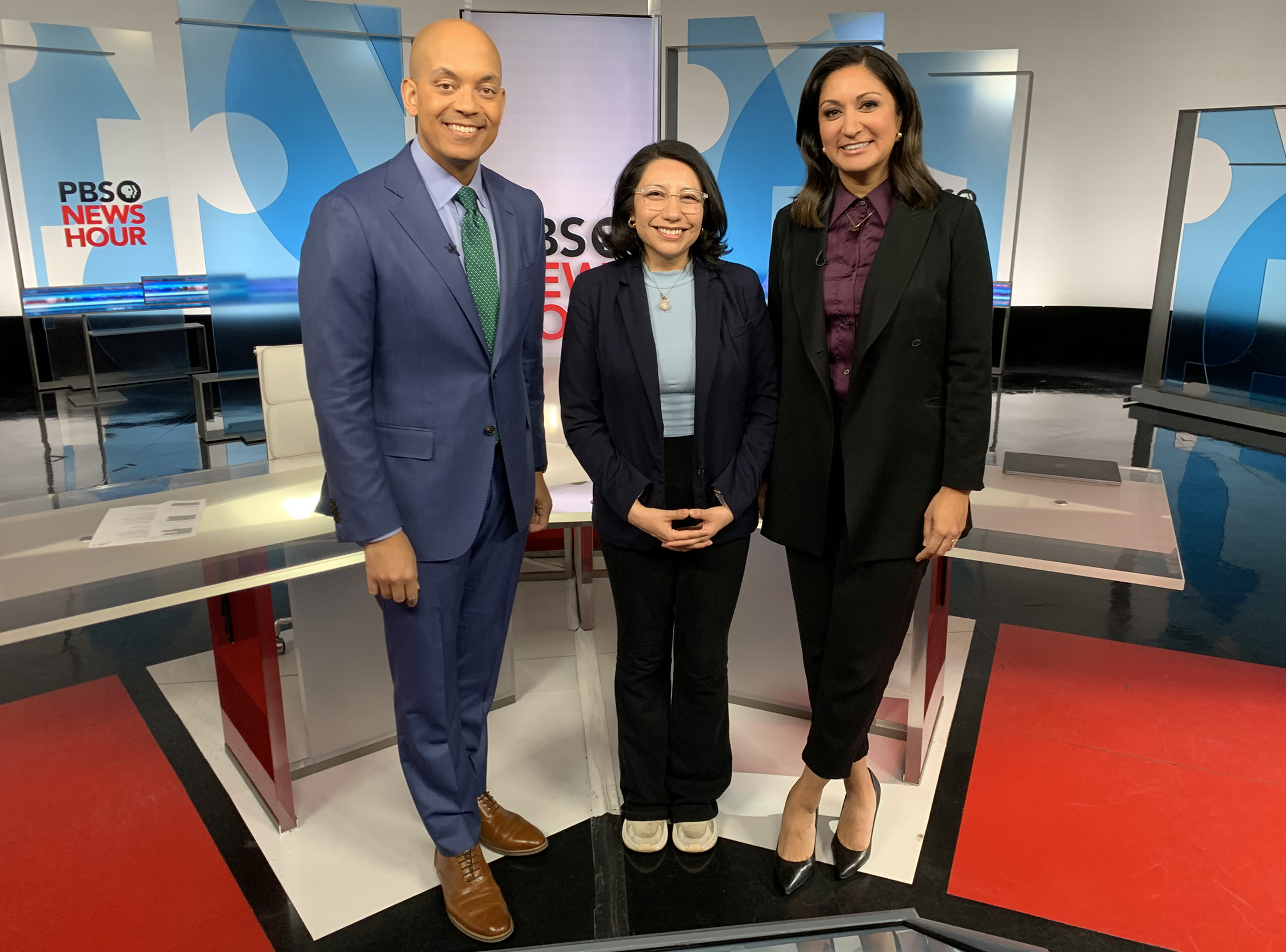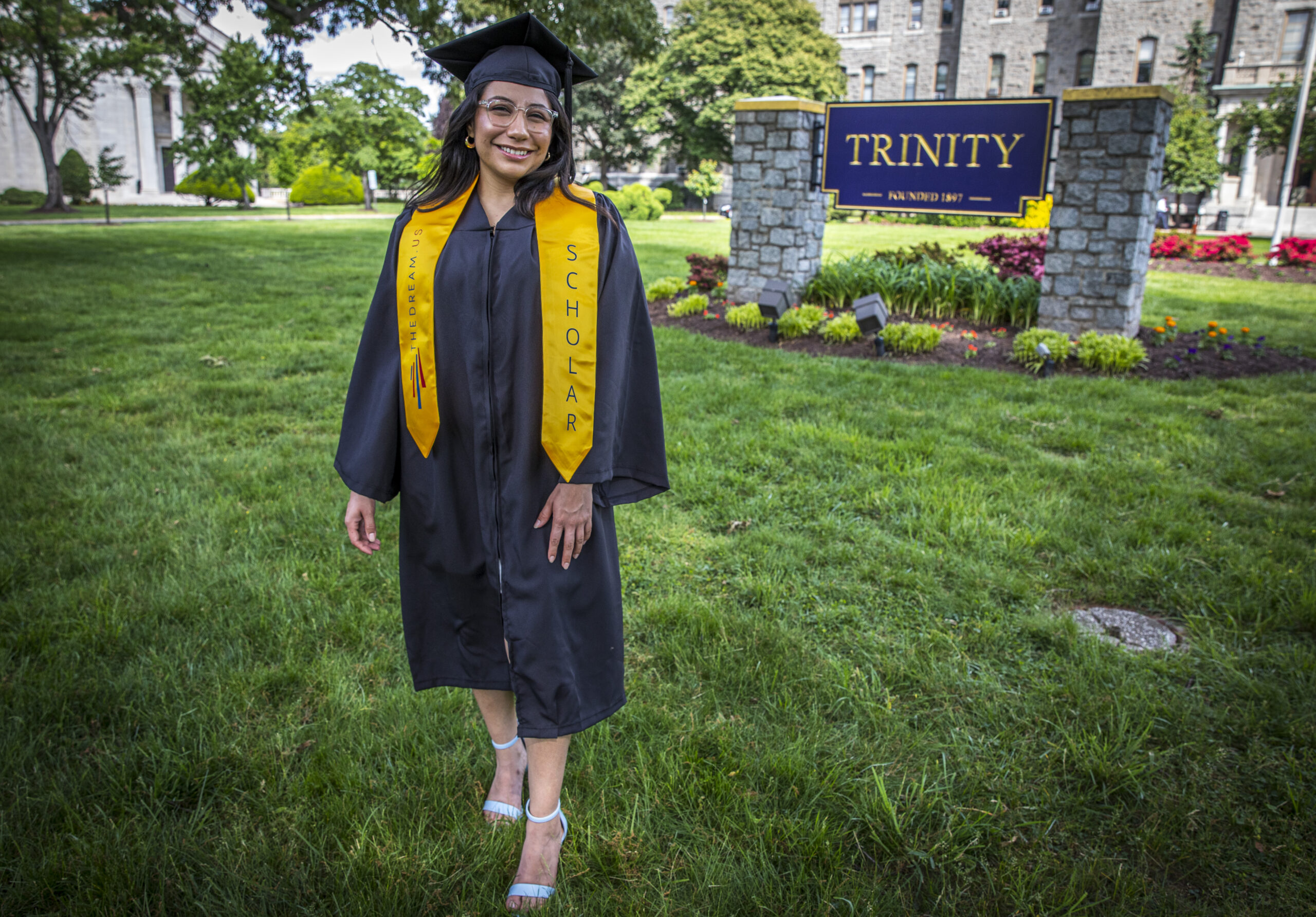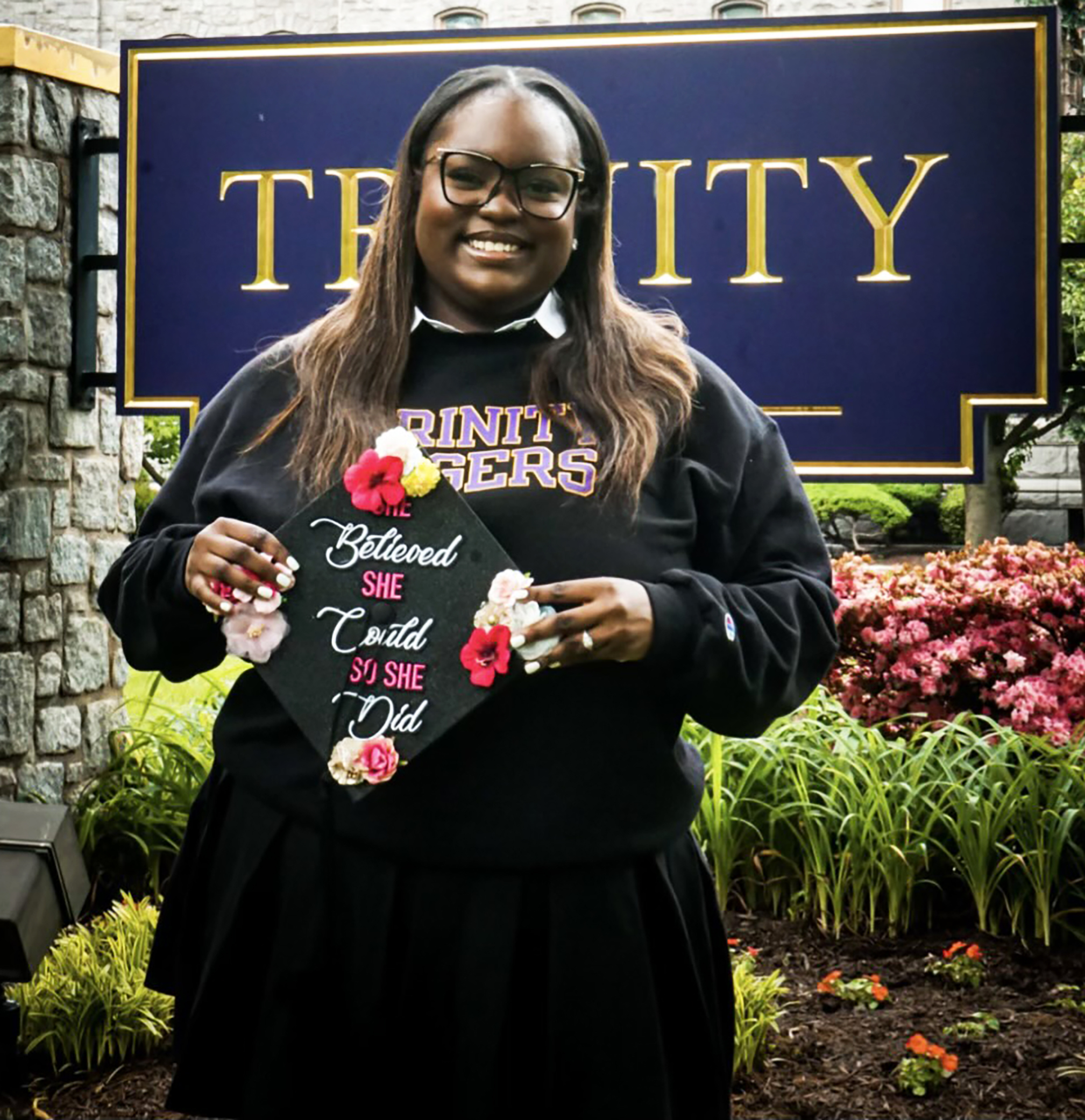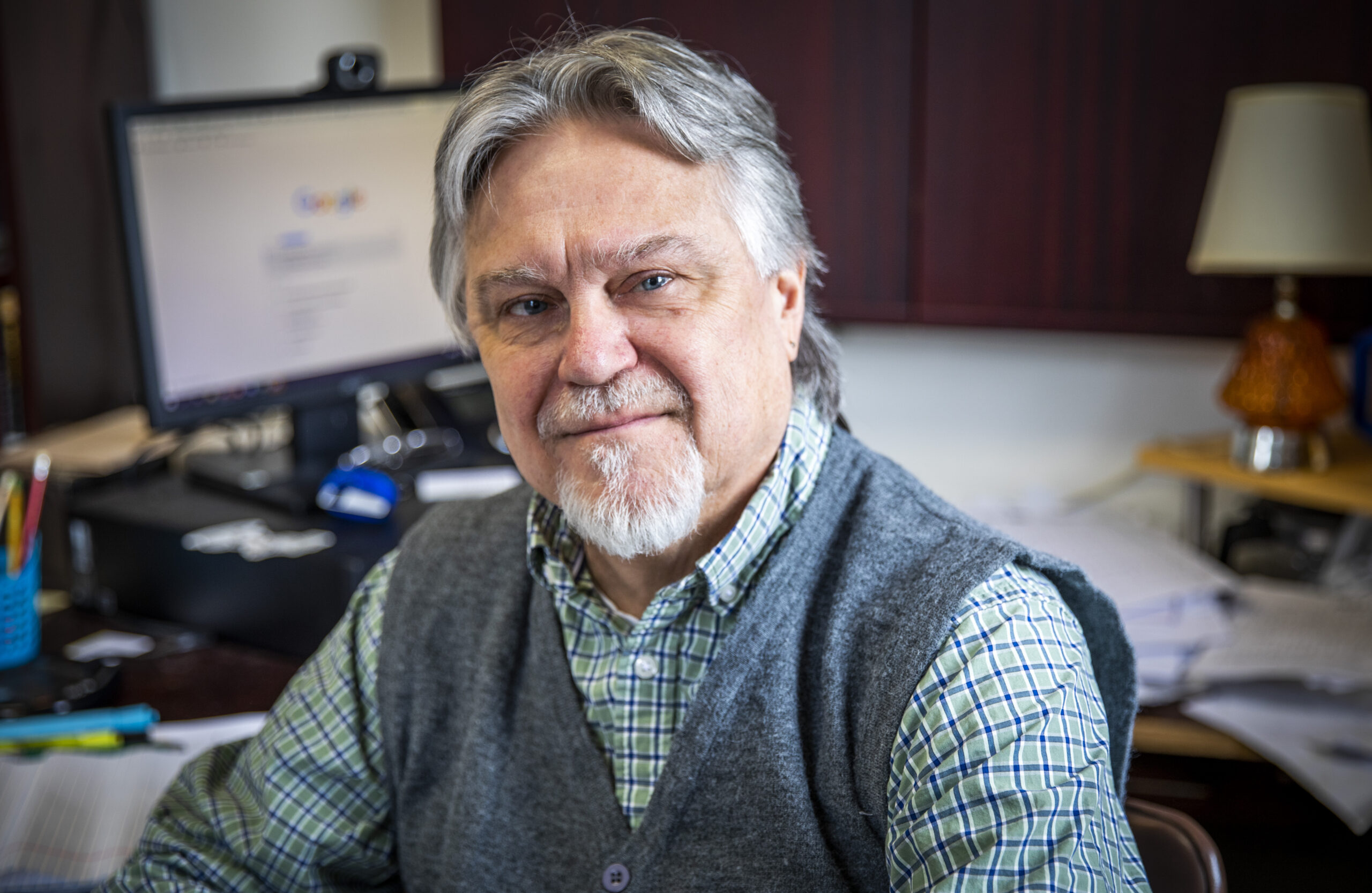
By Sondreen Johnson
Trinity Times Correspondent
For Trinity Washington University graduate Miriam Barcenas, the spring day in 2023 when she received her bachelor’s degree was a dream come true.
Fast forward nine months later, Barcenas is working for a national news program and though she’s thrilled to have a job in her chosen career path of journalism, the ground floor of the profession is a little more intense and fiercer than she ever imagined.
“I’m extremely grateful to have a job in the field that I actually went to school for,” she told Trinity Times about her role as a news assistant at the PBS (Public Broadcasting Service) NewsHour, a national news program produced by PBS member station WETA-TV in Washington. But “there is a lot of competition in my field. I wasn’t prepared for that dog-eat-dog world.”
Barcenas is among the hundreds of other Trinity students to receive their long-sought-after degrees in May of 2023 and nearly a year into her dreamed-of career, she is learning that she is now in the beginning of a whole new journey.

In her final years at Trinity as a Journalism and Media Studies major with a minor in Africana Studies, Barcenas exceeded expectations in her schoolwork, tutored fellow students, organized campus advocacy demonstrations for causes for which she was passionate, became a member of the inaugural reporting staff of the relaunched student news organization Trinity Times, and brought attention to immigration rights as a recipient of Deferred Action for Childhood Arrivals (DACA).
DACA is a U.S. policy that allows immigrants brought into the country unlawfully as children to receive renewable two-year periods of deferred action from deportation and become eligible for employment authorization.
As the first member of her family to earn a bachelor’s degree, Barcenas viewed this accomplishment as the path to a brighter future in a fulfilling career with greater wage potential, and possibly propelling future generations of her family with loftier opportunities.
Within weeks of graduation, she reported to work at WETA as a news assistant at the nationally acclaimed PBS NewsHour, where she assists the newsroom by organizing news scripts for correspondents and news anchors, researching news topics, conducting pre-interviews and pitching stories for both broadcast and digital content.

Though Barcenas is overjoyed to have the opportunity to launch her journalism career at such a well-respected news organization, the realization was swift that this was like being a freshman in college again and how much she needs to learn to advance in her field.
Like most Americans with college degrees, Barcenas sees the value of her education.
A whopping 79% of college graduates said their education was extremely useful in helping them grow personally and intellectually, 70% said it opened doors for job opportunities and 65% said it allowed them to develop specific skills and knowledge they used in the workplace, according to a 2021 survey by the Pew Research Center.
Barcenas believes her professors at Trinity helped prepare her for this chapter in her career and provided her with the ethical understanding of good journalism, but she did discover that she wasn’t disciplined enough when she began her job at the NewsHour.
“Working in the field can be difficult,” she said, admitting that the rigor and pace made her head spin. “There are no missing deadlines at work!”
When Barcenas conducts research, she must be confident that what she presents to the news team is accurate and must show proof that the information gathered is fact and not opinion.
The workdays are long, and her schedule is unpredictable and she is discovering that journalists in the dawn of their careers often struggle to find a work-life balance.
It’s all worthwhile, she added, knowing the hard work will propel her career and her college degree gives her greater earning potential.
In fact, data from the U.S. Bureau of Labor Statistics shows that college graduates earn an average of 56% more than those without a college degree.
This element isn’t lost on 2023 Trinity graduate Dae’zanae Williams, who relocated to Houston following her commencement last May to take a job with the Department for Justice as a re-entry case worker for newly released prison inmates.
The job satisfaction Williams has nearly a year after graduation is beyond her expectations and her annual $65,000 salary makes her appreciate the value of her education.
“As a first-generation college graduate in my family I’m extremely proud of myself,” she told Trinity Times. “It wasn’t easy working two full-time jobs while being a full-time student. Yet here I am. Getting my degree was the start of my new life.”

When Williams first enrolled in college, she originally planned to become a nurse.
However, when she became involved in the Black Lives Matter Movement, her interests pushed her to reorient her education and major in criminal justice with a concentration on corrections and the juvenile justice system.
Williams’ criminal justice studies and an internship working with lawyers helped prepare her for her new career, one that she cherishes.
As an entry level case worker where she meets with the released inmates and goes over their plans for re-entering society, Williams said her senior level co-workers provide her with encouragement and growth in the job and love that she’s excited to learn more.
“Dealing with those who are incarcerated, you have so many fears,” she acknowledged. “Imagine my surprise when I was met with so much respect and kindness. That alone amazes me.”
Both Barcenas and Williams said they would advise current Trinity students to take full advantage of internship opportunities and to learn from their professors, but they also suggest they grant themselves some grace in their college journey.
Williams said she was particularly critical of herself during college and over analyzed her journey, which took a toll on her mental health.
The facts are that 22.3% of bachelor’s degree-earners take more than four years to complete their program, according to a 2021 report from the Education Data Initiative.
However, Williams stressed that her grade point average did matter when she was job hunting, with potential employers often requesting an official transcript to track how she performed throughout college.
It’s how employers determine a job candidate’s work ethic and potential when they have little to no experience fresh out of college, she said.
Trinity graduates who excel after commencement are usually the students who plan for their entry into their career field and utilize the resources available to them at the university, said Thomas Mostowy, dean of Trinity’s School of Professional and Graduate Studies.

Mostowy frequently advises many undergrads to reach out for letters of recommendations, especially when they are actively seeking employment or changing their career fields.
“It’s very different for each student, especially when you compare day students vs. night students,” he said about undergraduates transitioning from college into their careers.
“Day students are considered to be traditional students, (and the university’s) Career Services (team) are involved for quite some time as they transition into society,” Mostowy said. “Evening students (often referred to as nontraditional students) typically aren’t required to do an internship, while traditional students are required.”
There is a simple reason for this distinction, he said.
“In most cases nontraditional students are now working in their field or related to their field of study,” Mostowy said. “Generally, nontraditional students’ goals consist of higher pay, stepping into management positions, or in some cases to change their current careers paths.”
In many ways, Barcenas views her first job out of college to be a continuation of her educational journey, since she is still learning how to be a resourceful and responsible journalist.”The biggest difference is, for one, I’m getting paid while I’m learning,” she said. “The pace is also much more intense.”
Thank you for this beautiful article of Trinity grads who are working, and their reflections on this moment in their lives. Both Mariam and Da’shanae offer great outcomes to their hard work as students, and now, as professionals.
Mariam, I watch the NewsHour and am so excited for you, and for them, working with you!
Peace and Joy,
Sr. Ann
Excellent article. The detailed research and interviews of the subject material is exceptional. Well done.